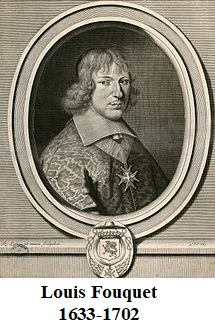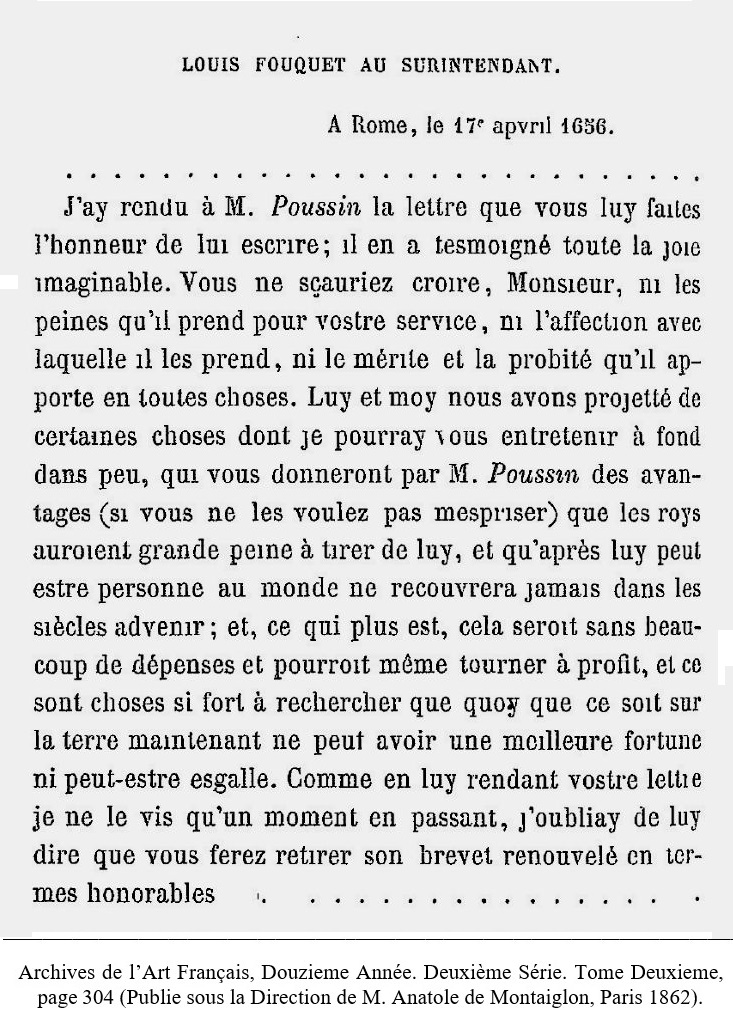Nicolas Poussin’s Great Secret
https://gallica.bnf.fr/ark:/12148/bpt6k55508826/f311.item
Paul Smith
12 June 2018
Updated 23 January 2022
This part of a letter by Abbé Louis Fouquet, written to his brother Nicolas Fouquet (Superintendent of Finances) – often linked to the fantasy treasure of Rennes-le-Château – referring to something that “no one in the world will ever recover in the centuries to come; and, what is more, this could be done without much expense and could even turn to profit” – could certainly be a reference to the skilful art of forgery. Even today, it is not certain which artefacts in museums are authentic and genuine – or whether they are forgeries crafted by talented artists like Nicolas Poussin. Provenance of archaeological artefacts was always a problem. Nicolas Fouquet was convicted and imprisoned to life in 1661 relating to crimes involving peculation (maladministration of the state's funds) and lèse-majesté (actions harmful to the well-being of the monarch). His brother was exiled to Villefranche-de-Rouergue then, in 1668, to Issoudun – and later placed under house arrest when he returned to his diocese.
Louis Fouquet to the Superintendent (Nicolas Fouquet)
In Rome, the 17th of April 1656
I have delivered to M. Poussin the letter which you have done him the honor of writing to him; he has witnessed all the imaginable joy. You would not believe, Monsieur, either the pains he takes for your service, the affection with which he takes them, or the merit and probity he brings in all things.
He and I have planned certain things, of which I shall be able to talk to you in depth, which will give you by M. Poussin advantages (if you do not wish to despise them) that Kings would have great difficulty in drawing from him, and that after him perhaps no one in the world will ever recover in the centuries to come; and, what is more, this could be done without much expense and could even turn to profit, and these are things so hard do discover that no one, no matter who, upon this earth today could have better fortune or perhaps equal. As I returned your letter to you for a moment, I forgot to tell you that you will have his renewed patent withdrawn in honorable terms.
Louis Fouquet au Surintendant (Nicolas Fouquet)
A Rome, le 17 apvril 1656
J’ai rendu à M. Poussin la letter que vous luy faites l’honneur de lui escrire; il en a tesmoigné toute la joie imaginable. Vous ne scauriez croire, Monsieur, ni les peines qu’il prend pour vostre service, ni l’affection avec laquelle il les prend, ni le mérite et la probité qu’il apporte en toutes choses. Luy et moi, nous avons projetté de certaines choses dont je pourray vous entretenir à fond dans peu, qui vous donneront par M. Poussin des avanteges (si vous ne les voulez pas mespriser) que les roys auroient grand peine à tirer de luy, et qu’après lui peut-estre personne au monde ne recouvrera jamais dans les siècles à venir; et, ce qui plus est, cela seroit sans beaucoup de dépenses et pourroit même tourner à profit, et se sont choses si fort à rechercher que quoy que ce soit sur la terre maintenant ne peut avoir une meilleure fortune, ni peut-estre esgalle. Comme en luy rendant vostre lettre je ne le vis qu’un moment en passant, j’oubliay de luy dire que vous ferez retirer son brevet renouvelé en termes honorables.
Archives de l’Art Français, Douzieme Année. Deuxième Série. Tome Deuxieme, page 304 (Publie sous la Direction de M. Anatole de Montaiglon, Paris 1862).


|

